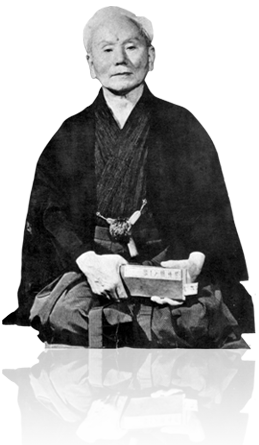Origine du mot ‘Karaté’
Comme les paysans étaient constamment agressés, ils ont commencé à développer des méthodes de combat à "mains nues" et quelques techniques de self-défense. Cette méthode de combat a été nommée “Karaté” (à cause de son origine chinoise). A cette époque, Karaté s’écrivait en Kanji (les caractères chinois) et signifiait “la main chinoise”.
Le fondateur du Karaté moderne, Maître Gichin Funakoshi (décédé en 1957 à l'âge de 88 ans) transforma ces Kanji en "main vide". Il ajouta aussi le caractère "do" (le chemin) à la fin du mot Karaté. Pour ce grand Maître, le Karaté-Do représentait bien sûr un art martial mais aussi une voie qui devait conduire au développement de son propre caractère et de sa propre personnalité.
The 20 Precepts of Gichin Funakoshi
1.Karate is not only dojo training.
2. Don’t forget, Karate begins & ends with a bow.
3. In Karate, never attack first.
4. One who practices Karate must follow the way of justice.
5. First, you must know yourself. Then you can know others.
6. Spiritual development is paramount: technical skills are merely a means to an end.
7. You must release your mind.
8. Misfortune comes out of laziness.
9. Karate is a lifelong training.
10. Put Karate into everything you do.
11. Karate is like hot water; if you do not heat it constantly, it will become cold.
12. Do not think you have to win. Think you do not have to lose.
13. Victory depends on your ability to tell vulnerable points from invulnerable points.
14. Move according to your opponent.
15. Consider tour opponent’s hands & legs as you would sharp swords.
16. When you leave home, think that millions of opponents are waiting for you.
17. Ready position for beginners & natural position for advanced students.
18. Kata is one thing. Engaging in a real fight is another.
19. Do not forget (1) strength & weakness of power, (2) expansion & contraction of the body, (3) slowness & speed of techniques.
20. Think strategy at all times.
